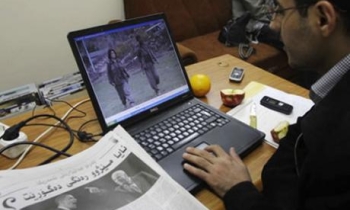DOHA: The motion "This House believes that Arab media needs no lessons in journalism from the West" was defeated with a majority of 68.3 per cent votes at the Qatar Foundation's Doha Debates yesterday.
A host of controversial issues in journalism ranging from the Al Qaeda tapes to the Danish cartoons on Prophet Mohammed (PBUH) were raised at the lively and enlightening debate.
Speaking for the motion were the London-based Khaled Haroub, host of a weekly programme on Al Jazeera and Marc Lynch, associate professor of political science at Williams College in the US and an analyst on Middle East issues.
Those who opposed the motion were Abdallah Schleifer, a veteran American journalist who covered the Middle East for more than two decades for NBC News, Jeune Afrique of the New York Times and Mona Eltahawy, an Egyptian-born journalist who writes for leading international newspapers including the Arabic language Al Sharq Al Awsat.
The monthly debate was hosted by former BBC presenter Tim Sebastian. Khaled Haroub, the first speaker wondered what lessons the Arab media could learn from the western media, which he said, were working in alliance with "the ugly western politics".
He maintained that the mainstream media in the west, which had been terribly misinforming the public by repeating the lies told by the western governments, had no moral ground to teach lessons to the Arab media.
Abdallah Schleifer countered his arguments saying that Arab satellite channels, including Al Jazeera had learnt many lessons from the western media, which helped them reach their current status. He said western media has a lot to offer to the Arab media, especially in terms of field reporting and professionalism.
He said it was the American media which broke many stories like gazing of Kurds in Iraq by Saddam Hussain, which the Arab media tried to bury. Marc Lynch, the next speaker, said there was a "breathtaking" and "revolutionary" transformation in the Arab media over the past 10 years, especially after the launch of Al Jazeera.
Mona Eltahawy, citing her own experience of working in Egypt, said press freedom was still a far cry in the Arab world. Journalists are put to intimidation and strict government control. This is the case in almost all the Arab countries, in Egypt, Syria, Saudi Arabia and Libya, to name a few, she said.
The floor was then opened to questions. A student participant sought the panelists' view on the cartoons of Prophet Mohammed (PBUH) appeared in a Danish newspaper. Schleifer replied by saying that this was not journalism but pure sensationalism. He added that many humiliating comments about Christian and Jewish faiths, which appear in the Arab media go unnoticed with none to apologise for them.
Tim Sebastian invited the audience view about Al Jazeera's policy of showing Al Qaeda tapes frequently. Khaled tried to defend the Al Jazeera stand saying that all television channels were vying to get those tapes. He said CNN had shown some Al Qaeda tapes which were rejected by Al Jazeera.









